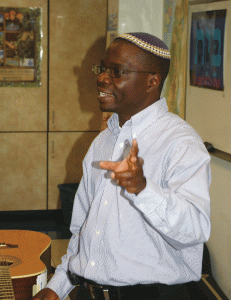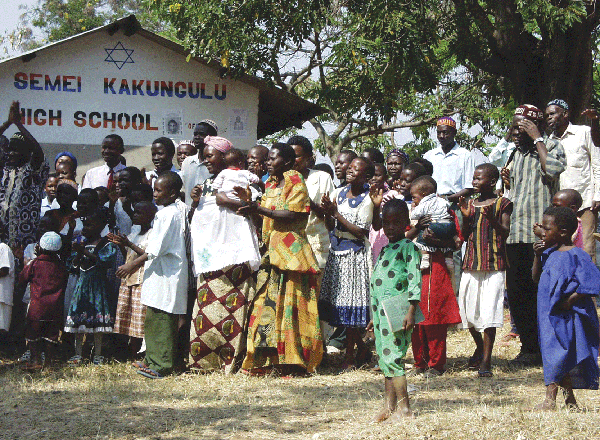Rabbi Gershom Sizomu relates story of Uganda’s Abayudaya community
By TAMAR FENTON
When Israeli commandos stormed the airport terminal in Entebbe, Uganda, on July 4, 1976, they and the 260 passengers of the hijacked aircraft were probably unaware that a small Ugandan Jewish community had gathered in their village 175 miles away to pray for the safety of their brethren.
In fact, the Ugandan Jewish community was unknown to most of the world until after the fall of Ugandan dictator Idi Amin in 1979.
Though the community is small in number, its unique history and recent revitalization are remarkable. If their rabbi, Gershom Sizomu, and Be’chol Lashon (In Every Tongue) — a San Francisco-based Jewish nonprofit organization that works to promote a global Jewish community — have their way, the story of the Ugandan Jews will become widely known in short order.
Sizomu recently visited Minneapolis and served as scholar-in-residence, from May 22-24, at Beth El Synagogue in St. Louis Park. He also spoke to groups of students at the Amos and Celia Heilicher Minneapolis Jewish Day School about life in his village near Mbale in eastern Uganda.
During several events throughout the weekend, Sizomu shared the genesis of the Jewish community of Uganda, shed light on the tremendous hostility that the small minority community has endured, and reported on efforts to rebuild the community that almost became extinct under Amin’s tyrannical rule.
Sizomu, 40, is the only rabbi in Uganda and the only black rabbi from sub-Saharan Africa to be ordained by an American rabbinic school (he was ordained in 2008 by American Jewish University in Los Angeles). After graduating from rabbinic school, he returned to Uganda and opened a yeshiva to train teachers and rabbis to serve growing Jewish communities throughout Africa.Â
“It is vital for African Jews to have rabbis from their own countries,” he said. “And it is important that Africans and others know that they can choose Judaism as a spiritual path and that we are open to them.”
The Ugandan community does not claim its lineage from one of the lost tribes of Israel, according to Sizomu. Rather, when missionaries sought to Christianize Uganda at the turn of the 20th century, they enlisted the support of the revered Ugandan warrior Semei Kakungulu. After studying both the Torah and the New Testament, Kakungulu chose to be circumcised and adopt the practices of Judaism as written in the Torah, and began teaching other Ugandans about Judaism.
Having no exposure to later rabbinic writings, however, the practice of Judaism in Uganda did not incorporate the postbiblical practices that are the tenents of modern Judaism. The community is called the Abayudaya, which means, “People of Judah.”
Until Kakungulu’s death in 1928, the community grew rapidly, reaching 8,000 devotees. Without its charismatic leader, however, the community lost many members due to attrition and anti-Jewish hostilities.
When Amin came to power in 1971, the practice of Judaism was banned altogether and Jews were persecuted. The community dwindled to just 300 members under the spiritual leadership of Sizomu’s grandfather and father.
Since 1979, the community has regained momentum; and those who left Judaism under Amin, as well as new converts to Judaism, have strengthened the community, which has grown to more than 1,000 members.
Sizomu explained how the small Ugandan Jewish community is helping to improve conditions for its Christian and Muslim neighbors in Uganda by addressing social, educational and economic ills plaguing the entire region. With the support of Be’chol Lashon, the Abayudaya are engaged in a comprehensive health and development project that includes building a health center, preventing disease and developing the economy.
“Rabbi Sizomu really inspired the congregants of Beth El with his stories,” said Be’chol Lashon program coordinator Andrew Esensten, who accompanied the rabbi to Minneapolis. “It was a revelation to some that there are Jews in Uganda, and a bigger revelation that these Jews are thriving and doing tikkun olam by providing water, mosquito nets and basic health care for free to Jews, Christians and Muslims alike.”
Be’chol Lashon provided the funding for Sizomu’s rabbinic studies and continues to support his community in Uganda through grants, fundraising assistance and by coordinating his speaking tours in the United States.
Beth El Rabbi Avi Olitzky announced that he will lead a Jewish community trip to Uganda to visit the Abayudaya community in about 18 months. For information about the trip, contact Olitzky at: aolitzky@bethelsynagogue.org.
***
For information about Sizomu, the needs of the Abayudaya or Be’chol Lashon, visit: bechollashon.org/projects/abayudaya/projects.php. The Grammy-nominated recording of traditional Abayudaya music is also available through the Be’chol Lashon Web site.Â
Â
Â
Â






















Informational meetings for the Beth El Trip to Uganda in December 2010 will be held on January 17th following Hevrah breakfast (around 10:00 a.m.) and January 26th at 7:00 p.m. Contact Rabbi Olitzky via e-mail (aolitzky@bethelsynagogue.org) or by phone at 952-920-3512, ext. 111 with any questions.